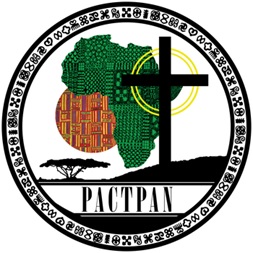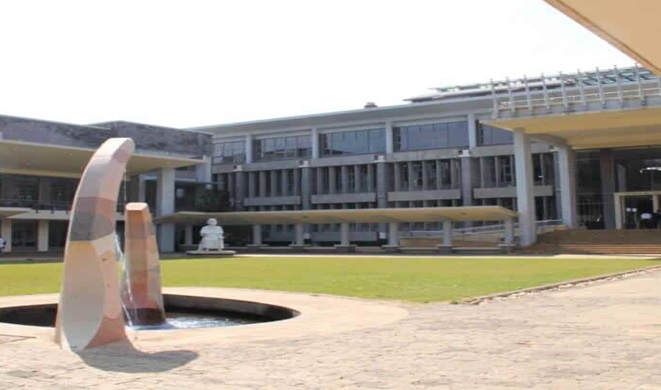| Pan-African Catholic Theology and Pastoral Network (PACTPAN) |
| Pan-African Catholic Theology and Pastoral Network (PACTPAN) |

SECOND BIANNUAL PAN-AFRICAN CATHOLIC CONGRESS ON THEOLOGY, SOCIETY AND PASTORAL LIFE
|
Pan-African Catholic Theology and Pastoral Network (PACTPAN) |
|
|
|
The Second Biannual Pan-African Catholic Congress on Theology, Society and Pastoral Life, was held at the Catholic University of Eastern Africa (CUEA), Nairobi, Kenya from July 18 to 23 under the theme “Walking Together for a Vital Church in Africa and in the World. It was a success story. The Spirit of God was indeed at work.
The five-day congress organized by of Pan-African Catholic Theology and Pastoral Network (PACTPAN) brought together about 200 theologians, scholars, pastoral agents and social justice leaders from Africa, Asia, Canada and the United States of America, Europe, and Latin America. The congress participants gathered for a joint dialogue on themes related to Synodality: (1) Paradigms of Synodality (2) Blessed Virgin Mary & Religious Witness (3) The Role of Women and Leadership, (4) Ministry to the Children in Church & Society (4) The Future of the Vital Church in Africa and Global contexts.
PARTICIPATING UNIVERSITIES, PARTINERS AND COUNTRIES
The main participating universities and partners included The Catholic University of Eastern Africa in Nairobi (host); Catholic University of Leuven, Belgium, Catholic University of Zambia, Center d’ Etudes des Religious Africaines de L’Unversite Catholique du Congo, DePaul University, Chicago, USA, Durham University, Durham, England, University of Vienna, Austria, Veritas University, Abuja, Nigeria, Fu Jen Faculty of Theology of St Bernardine, Taipei, Taiwan, Adamson University, Manila, Philippine, L’Institut de Théologie de la Compagnie de Jésus, Abidjan, Ivory Coast and Concilium.
Participating members of the People of God came from the following African countries: Benin, Burkina Faso, Burundi, Cameroon, Cote d’Ivoire, Democratic Republic of the Congo, Equatorial Guinea, Ethiopia, Ghana, Kenya, Malawi, Mozambique, Nigeria, Republic of the Congo, Senegal, South Africa, South Sudan, Tanzania, Togo, Uganda, Zimbabwe, and people in solidarity from all other continents of Europe, Asia, Latin America, USA and Canada. we affirm the vitality of the Catholic Church in Africa as a sign of hope for the world.
VISION AND SIGNIFICANCE OF THE 2022 II PAN-AFRICAN CATHOLIC CONGRESS
The VISION of the Pan-African Catholic Theology and Pastoral Network is to bridge the gap between pastoral practices, scientific, and multi-disciplinary works in the continent. It is about listening to God, the cry of our Mother Earth, and to the concerns of our people, in order to help them live flourishing lives rooted in our Christian faith and our African spiritual and religious traditions. Our active listening explains the choice of the theme of this Second Congress “Walking together for a vital church in Africa and in the world” which focused on Synodality; the experiences of African women, the marginalized and children; and the challenges and prospects of building a vital Church in Africa.
This II Pan-African Congress (Nairobi) was significant because it was preceded by the General Assembly (July 16-18, 2022) of the Editorial Board of the International Catholic Theological Journal, Concilium. This is the first time that such a meeting has been held in Africa. Concilium was founded in 1965 by Catholic theologians to promote the Theology of the Second Vatican Council (1962-1965) and to contribute to new ways, trends and approaches of doing integrated and contextual Theology in response to the signs of the times. This was indeed a unique and extraordinary gathering of some leading theologians and scholars from Africa and worldwide.
The Pan African Congress II was deemed timely, unique as well as being the largest so far in the recent past in Africa. The rich array of professional, well established and renown scholars, Church leaders and frontline pastoral and social agents of transformation from Africa and global contexts was a living testimony of what the vision of Pan African Catholic Theology and Pastoral Network (PACTPAN) is all about.
In his welcome address the Coordinating Servant of PACTPAN, Rev. Prof Stan Chu Ilo said, “The presence of a large number of delegates from outside Africa, including the Concilium Board of Editors, representatives from the Holy See, and some of the most important theologians and scholars in the World Church from every continent in the world, is a priceless gift of solidarity to the Church in Africa today. The rich array of influential scholars, practitioners, church leaders and frontline pastoral and social agents from Africa at this Congress, are legible markers of the diversity and impact of Christian prophetic witness in Africa today. Our gathering is truly a model of what Pope Francis has called “a culture of encounter” or what I will rather call, Pope Francis’s African Ubuntu for global fraternity and solidarity.”
POPE FRANCIS’ HISTORICAL MESSAGE TO MEMBERS OF THE CONGRESS
|
|
|
|
EUCHARISTIC CELEBRATIONS AT THE BEGINNING AND CLOSING OF THE CONGRESS.
The Inaugural Mass of the Holy Spirit was presided over by the Archbishop of Nairobi Archdiocese, Most Rev Philip Anyolo while the closing mass was presided over by Bishop Sithembele Sipuka of Mthatha Diocese, South Africa. The Rt. Rev. Sithembele Sipuka, who is also a member of the board of advisors of PACTPAN underscored the role of the Pan-African congress as “to help us to effectively evangelize, to make people relate to God according to who they are as persons and as Africans so that they feel at home in being Christian and Catholic, and then together with them in the light of their discovered dignity, they get to address those things as true faith-filled.”.
|
Official Opening Mass of the Congress in MISSIO Hall (CUEA) on July 19, 2022 |
KEYNOTE ADDRESS OF THE FOURTH DAY – BY PROF. CLEMENT MAJAWA
On Thursday, July 21st 2022, Rev. Prof. Clement Majawa from the Catholic Archdiocese of Blantyre in Malawi delivered a Keynote Address of the day. His ecclesial-pastoral theological presentation was entitled “Integrated Narrative for Participatory Vital Church of the Future: FIVE LESSONS from Multi-disciplinary Scholarship, Theology and Pastoral Work in Africa”. Prof. Majawa is the Head of the Department of Dogmatic Theology and lectures in the Faculties of Theology and Education at CUEA in Nairobi. After the Keynote Address (7.45-9.30 pm in CUEA’s Learning Resource Centre) Prof. Majawa (together with other Leading Scholar-Theologians), was recognized, honored and presented with prestigious AWARD of EXCELLENCE by the 2022 Second Biannual Pan-African Congress.
SPECIAL RECOGNITION AND AWARD OF EXCELLENCE IN SCHOLARSHIP AND RESEARCH TO SOME LEADING CATHOLIC THEOLOGIANS FOR THEIR OUTSTANDING CONTRIBUTIONS TO THE TRANSFORMATION OF THE CHURCH AND SOCIETY
The following distinguished Professors received awards of excellence during the Congress for their outstanding contributions in the wholistic Development and Transformation of Theology, Church and Society in Africa:
(1). Bishop John OKOYE (Nigeria).
(2), Rev. Prof. Clement MAJAWA (Malawi).
(3). Rev. Prof. Late Laurenti MAGESA – Post-humous /1946-2022 (Tanzania).
(4). Rev. Prof. Paulin POUCOUTA (Cameroon)
(5). Rev. Prof. Patrick ALUMUKU (Nigeria)
(6). Rev. Prof. Francis APPIAH-KUBI (Ghana)
(7) Sr. Prof. Josee NGALULA (DR Congo)
.
(8). Sr. Prof. Florence Adetoun OSO (Nigeria).
(9). Rev. Prof. Paul GIFFORD (New Zealand / United Kingdom)
(10). Rev. Prof. Joseph HEALEY (USA)
(Below is Prof. Clement Majawa receiving the AWARD of EXCELLENCE and OUTSTANDING RECOGNITION to the Research Development and Transformation of Theology, Society and Pastoral Life in Africa and in the World).
SOME OF THE CONGRESS’ INSPIRING AND REFORMATIVE OUTCOMES.
Within this time together, the participants at the Second Pan-African Congress (NAIROBI) through embracing the palaver and reverential dialogical process, were able to harvest the some important fruits and pastoral recommendations under the thematic focus of the Congress, like the Synodality.
The Congress extensively discussed, reflected and discerned on the pertinent Themes of Synodality; concerns, aspirations, hopes, and achievements of African women; our African children and their hopes and aspirations aimed at the flourishing of their lives in society. The gathering also considered the ways of being a vital church relevant to the context of Africa. As part of African life and thought, the Congress commit to continue to develop these themes in the coming years.
Thus, in view of Pope Francis’s invitation to the whole Church to embrace Synodality, this Congress reflected on various aspects of being a synodal Church in Africa. The collective dialogues among the participants at this Congress have focused on multiple issues, among others; the mutual collaboration of institutes of religious life and Catholic universities in our countries; the developing processes of palaver and reverential dialogue in the local churches; the new models of leadership of communities and institutions that are so necessary for the renewal of the churches; the recognition of the place of the laity, especially the place of women; the social dimension of Synodality that includes interaction with the protagonists of civil society; and the experiences of accompaniment with diverse human experiences marked by poverty and marginalization in need of friendship and hospitality.
Furthermore, with joy and spirit of ecclesial and pastoral togetherness, this Congress identified many positive initiatives playing out in our ecclesial communities, and social contexts. However, the Congress also noticed how much road ahead we still have to traverse in order to reach that place of flourishing for all persons who call Africa their home. The “plague of clericalism” for example, in some of our ecclesial communities, is a major obstacle to walking together as a family of God. It works against inclusion of all persons in the mission of the Church. The urgent and complex social problems that afflict us show how important it is that the synodal spirit –“walking together”–becomes a source of inspiration for ethical, ecclesial, and political commitments.
The Congress has called on local churches, social movements, universities, artists, and all persons to develop networks for mutual recognition, collaboration, and transformation of global society. This appeal will be actualized through local practices inspired by a culture of encounter, listening, discernment, and pastoral accompaniment in the spirit of the Church as Family of God and Salt and Light (Matthew 5: 13-16).
The III Biannual Pan-African Catholic Congress shall be held in Abidjan, Ivory Coast in 2024. The members are encouraged to participate actively in the continental and global activities of the network to promote the African palaver, theological research and scholarship, the Synodal Church and wholistic societal development.
